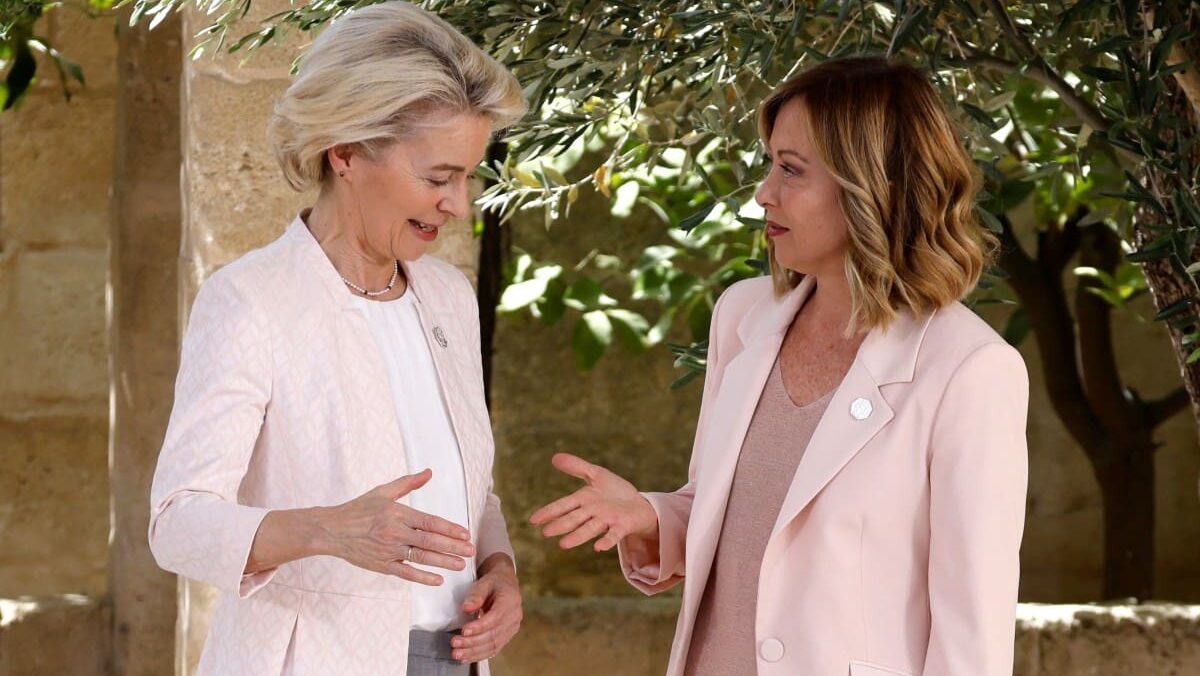
Photo: Ludovic MARIN / AFP
Italian Prime Minister Giorgia Meloni’s Fratelli d’Italia, the largest delegation of the European Conservative and Reformist (ECR) group, may still decide to support the Commission chief in exchange for an influential portfolio in the next EU executive, splitting from its allies who came out firmly against Ursula von der Leyen’s re-election bid. Only days are left until the landmark vote in Strasbourg on Thursday, but Meloni said she would only decide after meeting von der Leyen on Tuesday.
“There will be a meeting between ECR and Ursula von der Leyen [about her program], and depending on what she says, we will discuss with the other delegations [in ECR] and decide what to do,” Meloni said on the sidelines of the NATO’s Washington Summit a few days ago.
Nonetheless, she made it clear that her primary focus is not the interests of ECR—a group that has consistently criticized von der Leyen’s work over the past five years and that was regularly sidelined by the Commission chief’s center-left coalition during legislation—but Rome’s, rather.
“As the prime minister of Italy, my sole objective is to bring home the best possible result. Italy’s role [in Europe] must be recognized,” Meloni said.
This ‘best possible result,’ in Meloni’s eyes, ideally constitutes having an EU Commission vice presidency coupled with an influential portfolio (such as home affairs or internal markets), to be given to Rome’s candidate, the current EU Affairs Minister Raffaele Fitto.
Negotiations about the next College of Commissioners will only commence once the top jobs, including the Commission president, have been confirmed by the Parliament, however. This means that von der Leyen can only promise a good result to Meloni in exchange for her 24 votes in Strasbourg—but there’s no way she can guarantee that the deal would also be approved by the other 26 member states later on.
Furthermore, any such deal would also split ECR itself, as many of Meloni’s allies within the group have already announced opposing von der Leyen’s re-election. Three parties, including the Polish PiS and the Romanian AUR—ECR’s second and third largest delegations, respectively—as well as the French MEPs formerly belonging to Reconquête said on Friday that their 27 MEPs will vote against von der Leyen on Thursday.
On the other side, we know that, apart from Meloni’s possible support, von der Leyen can expect the support of Czech PM Petr Fiala’s ODS with its three votes. The remaining 24 MEPs of ECR, mostly belonging to small delegations with one or two seats, haven’t disclosed their intentions yet, but the majority is likely to follow PiS and AUR’s example rather than Meloni’s FdI.
But that’s alright, as the ECR group “will give its delegations the freedom to vote as they wish” regarding von der Leyen, the bloc’s co-president Nicola Procaccini said on the same day.
“There has always been freedom of movement and decision for individual delegations within our group,” Procaccini explained. “Five years ago, the Fratelli d’Italia delegation did not vote for [von der Leyen], while the Polish PiS delegation did.”
As we explained before, the so-called ‘Ursula coalition’ of the past five years—made of the centrist EPP, the social democrat S&D, and the liberal Renew—theoretically has the numbers with its 401 seats to carry von der Leyen through the required threshold of 361 votes. However, as there’s always a 10-15% defection rate due to the secret ballot, the Commission chief is desperately looking for additional supporters outside of her coalition to cement her second term.
After meeting the liberals last week, von der Leyen also had ‘constructive’ talks with the Greens Both groups have nominally pledged their support on the condition that she won’t compromise on certain flagship projects started in the last term (including the Green Deal and the Migration Pact) and that she won’t make any deal with the “far-right” ECR.
In other words, the Renew and the Greens are setting the agenda despite being the biggest losers of the EU elections, ensuring that the very policies that European voters have rejected the most remain in place in the next term.
While structural cooperation in the Parliament between von der Leyen’s EPP and Meloni’s ECR is out of the question, as the Commission chief promised to the leftist groups, there is still a question about whether this more personal deal about Italy’s place in the Commission will fly under the radar. Nonetheless, von der Leyen does not really need the Italian votes with the Greens on board.
Fratelli d’Italia will announce its decision about the Commission president after she meets with the leaders of ECR on Tuesday.
